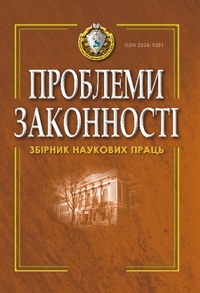Суб’єктивна сторона (mens rea) пособництва і підбурювання воєнним злочинам і злочинам проти людяності в контексті американського Закону про деліктні позови іноземців
Subjective Side (Mens Rea) of Aiding and Abetting War Crimes and Crimes Against Humanity in the Context of the Alien Tort Statute
Author(s): B.P. KarnaukhSubject(s): Civil Law, Human Rights and Humanitarian Law, Sociology of Law, Peace and Conflict Studies
Published by: Національний юридичний університет імені Ярослава Мудрого
Keywords: mens rea; aiding and abetting; war crimes; crimes against humanity; compensation for damage; tort law;
Summary/Abstract: The American Alien Tort Statute (ATS) is a landmark instrument on a global scale, since, based on its provisions, plaintiffs in American courts have sought compensation for human rights violations committed on other continents. Many of these cases involved war crimes and crimes against humanity. And since such large-scale crimes are almost never committed by a single perpetrator, one of the key issues before the courts in these cases was the question of establishing standards of liability for aiding and abetting such crimes. In considering these cases, the American courts based their decisions on the provisions of international law and thus developed a substantial body of case law, the study of which will undoubtedly be valuable in light of the legal challenges posed by the war in Ukraine. The objective of the article is to examine the requirements for the mens rea of aiding and abetting war crimes and crimes against humanity through the prism of the case law applying the Alien Tort Statute. From a methodological point of view, the study focuses on the analysis of the case law of American courts through the prism of international law. An important component of the research is to determine the contents of customary international law, the provisions of which are subject to separate proof in the relevant cases. The article itself is a part of comparative legal research with the aim of drawing lessons that could be used to solve the complex legal problems arising from the war in Ukraine. The article examines two standards of aiding and abetting used by American courts in cases under the Alien Tort Statute, namely, the purpose standard and the knowledge standard. The author examines the American precedents in which the courts have used one or the other standard. It is argued that the origins of the di should be sought in international law, since American courts in the relevant category of cases rely on international law. The author analyses the arguments of Judge Katzmann, whose position forms the basis for all subsequent decisions applying the purpose standard. The critical analysis of Judge Katzmann’s arguments is complemented by a thorough examination of the practice of international criminal tribunals - from the Nuremberg Tribunal to the later tribunals for Yugoslavia, Rwanda and Sierra Leone. The author concludes that the standard of knowledge is predominant and should be considered a rule of customary international law and should define the criteria of liability for harm caused by gross violations of internationally recognised human rights. sagreement
Journal: Проблеми законності
- Issue Year: 2023
- Issue No: 162
- Page Range: 279-296
- Page Count: 18
- Language: Ukrainian

